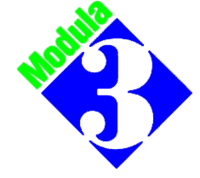Modula-3: Difference between revisions
Appearance
m Cleanup |
No edit summary |
||
| Line 1: | Line 1: | ||
[[Image:M3.png|200px|right]] | [[Image:M3.png|200px|right]] | ||
One of the few languages out there designed as a systems language from the outset | One of the few languages out there designed as a systems language from the outset. Originally developed by Acorn USA an operating system development tool and called Modula-2+, it added multitasking, threading and multi programming features to the [[Modula-2]] programming language, but M2 itself is a development of [[Pascal]] by its original author and adds separately compiled modules, stricter & clearer syntax and a host of system programming additions to Pascal in addition to a general clean up of the language features. Modula 3 is a development that adds memory management (garbage collection), type & generic safety features, generic programming, better exception handling and object-oriented extensions to Modula-2+. | ||
==A list of OS/2 implementations of Modula-3== | ==A list of OS/2 implementations of Modula-3== | ||
Revision as of 12:32, 28 October 2015

One of the few languages out there designed as a systems language from the outset. Originally developed by Acorn USA an operating system development tool and called Modula-2+, it added multitasking, threading and multi programming features to the Modula-2 programming language, but M2 itself is a development of Pascal by its original author and adds separately compiled modules, stricter & clearer syntax and a host of system programming additions to Pascal in addition to a general clean up of the language features. Modula 3 is a development that adds memory management (garbage collection), type & generic safety features, generic programming, better exception handling and object-oriented extensions to Modula-2+.
A list of OS/2 implementations of Modula-3
- SRC Modula 3 - Open source - Discontinued
- Modula 3 Reboot - Open source - Current?
Libraries and bindings
A list of DOS implementations of Modula-3
- SRC Modula 3 - Open source - Discontinued
- M3PC-Klagenfurt - Open source - Discontinued
Publications
Local articles
Tutorials and other learning material
Links
- Modula-3 Org - Info and links on the Modula 3 language.
USENET
- comp.lang.modula3 - Very low volume - Go to the Google groups version if you or your ISP are newsgroup challenged in some way.
Standards
- The revised version of the original Modula-3 report and the associated paper Some useful Modula-3 interfaces.